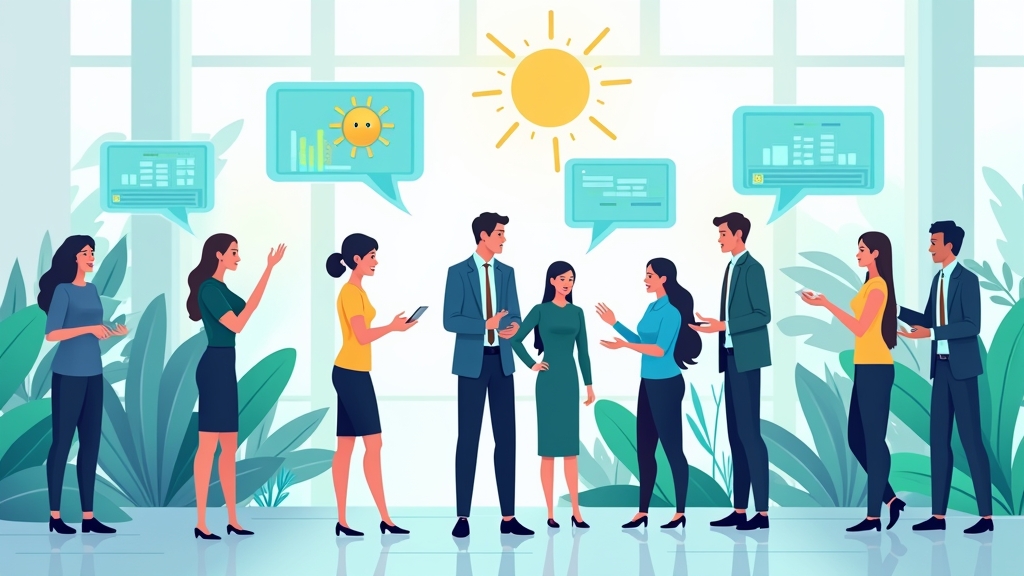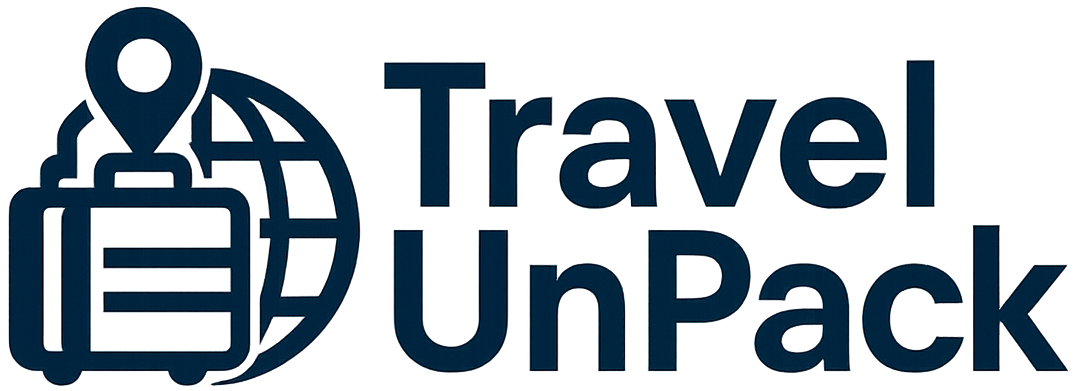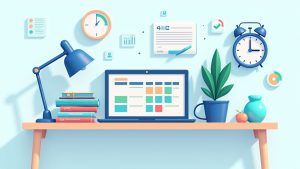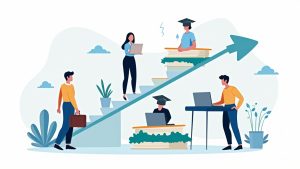How to Identify and Develop Your Soft Skills
The job market is constantly changing, and the ability to adapt to these changes depends much more on your skills than on your abilities. transversal skills than just technical knowledge. But what are these skills and how can you develop them? Let's explore this essential topic for the future professional.
What are transversal skills and why are they important?
Transversal skills, also known as soft skillsSoft skills are behavioral competencies that influence the way you interact with colleagues, solve problems and deal with challenges. Unlike technical skills (hard skills), which are specific to each profession, soft skills are universal and applicable in any field.
Imagine a professional who is extremely technically qualified but can't work in a team or communicate clearly. They will struggle to grow in their career, even if they are a specialist. On the other hand, someone with good interpersonal skills, resilience and the ability to adapt can excel even in adverse scenarios.
Why is that? Because the market increasingly values professionals who go beyond technical knowledge. A LinkedIn study showed that 92% of recruiters consider soft skills to be as important or more important than hard skills.
So if you want to prepare for the future, it's not enough just to master tools and techniques. You need to develop skills such as emotional intelligence, creativity, critical thinking and collaboration. But how do you identify which of these skills you already have and which you need to improve?
How to Identify Your Current Soft Skills
Have you ever stopped to think about what your main behavioral skills are? Often, we have skills that we don't even realize we have, but which make all the difference in our day-to-day work. The first step is to honest self-examination.
An effective way of identifying your soft skills is to review past situations in which you have excelled. For example, have you ever led a project without formally being the leader? This demonstrates informal leadership. Were you able to resolve a conflict between colleagues? Your mediation skills is a strong point.
Another strategy is to ask colleagues, friends and supervisors for feedback. Ask: "What are my main qualities at work?" or "In what areas do you think I could improve?". Often, others see abilities in us that we ourselves underestimate.
Tools such as 16Personalities personality test or TalentSmart's emotional intelligence test can help you map out your competencies. But remember: these tests are guides, not absolute definitions.
What if you discover that you need to improve in some areas? Soft skills can be developed with practice and dedication. The important thing is to be aware of where you are and where you want to go.
The Soft Skills Most Valued in Today's Market (and How to Develop Them)
Some soft skills are particularly valued in today's job market. Let's explore the main ones and how you can work on them:
Effective Communication
Knowing how to express yourself clearly, both in writing and in speech, is fundamental. This includes active listeningYou need to adapt your language to your audience and convey ideas persuasively.
To improve, practice writing every day (such as keeping a blog or writing more structured emails). Join debate or theater groups to lose your fear of public speaking. Courses such as those offered by Coursera can be useful.
Problem Solving and Critical Thinking
Companies are looking for professionals who not only identify problems, but also propose creative solutions. Develop this skill by practicing scenario analysisstrategy games and logic exercises.
A practical example: when facing a challenge at work, instead of just pointing out the mistake, ask yourself: "What are the possible causes? What alternatives do we have?".
Adaptability and Resilience
The world changes fast, and those who resist change are left behind. Train your adaptability by getting out of your comfort zone: learn a new skill, change your routine or try working on different projects.
Resilience is linked to the ability to deal with failure. When something goes wrong, instead of giving up, reflect: "What can I learn from this?".
Teamwork and Collaboration
No professional works alone. Improve your collaboration skills by practicing empathygiving and receiving constructive feedback and actively participating in group projects.
If you have difficulty in this area, try volunteering or team activities outside of work, such as team sports.
How to Practice Soft Skills in Everyday Life

Theory is important, but practice is what really makes the difference. How can you incorporate the development of soft skills into your routine?
In the workplace, observe how your colleagues communicate, resolve conflicts and make decisions. Ask to take part in strategy meetings or mentoring sessions. If possible, take on small projects that require skills you want to develop.
Outside of work, activities such as volunteeringextracurricular courses and even group games can help. For example, a board game like Pandemic requires collaboration and strategic planning - great for training teamwork!
Another tip is simulate challenging situations. If you're afraid of public speaking, practice in front of a mirror or record videos. If you want to improve your negotiation skills, role-play with a friend.
Remember: small daily actions have a big impact. Even a casual conversation can be an opportunity to practice active listening or empathy.
How to Demonstrate Soft Skills in Selection Processes
There's no point in developing soft skills if you don't know how to show them off at job interviews or on your CV.
In curriculumInstead of just listing "Good communication", give concrete examples: "I reduced conflicts in the team through mediation, improving productivity in 20%". Use keywords that recruiters are looking for, such as "leadership", "creativity" and "time management".
In interviewtell stories that prove your abilities. Use the STAR (Situation, Task, Action, Result): "In my last job (Situation), there was a delay in the project (Task). I organized a meeting to realign deadlines (Action), and we delivered on time (Result)."
If the process includes group dynamicsIn addition, show balance: don't dominate the conversation, but don't be passive either. Show that you collaborate, listen and contribute ideas.
The Role of Growth Mindset in the Development of Soft Skills
Have you ever heard of fixed mindset vs. growth mindset? According to psychologist Carol Dweck, people with a fixed mindset believe that their abilities are immutable, while those with a growth mindset see challenges as learning opportunities.
To develop soft skills, adopt a growth mindset. That means:
- See mistakes as part of the process, not as failures.
- Seek constant feedback and act on it.
- Believe that, with effort, you can improve in any area.
For example, if you think you'll never be good at public speaking, you're limiting yourself. Instead, think: "I'm not the best yet, but I can improve with practice."
Books like Mindset, by Carol Dweck can help change that perspective.
The Future of Work: Why Soft Skills Will Be Even More Crucial
With automation and artificial intelligence taking over technical tasks, human skills - such as creativity, empathy and adaptability - will be increasingly valued.
Professions that require complex human interaction (such as psychology, education and management) are unlikely to be replaced by machines. What's more, in a remote and globalized world, knowing how to work in a remote team and manage your time will be essential.
The report Future of Jobs 2020 from the World Economic Forum lists the top 10 skills for 2025, and most of them are soft skills, such as:
1. Analytical thinking and innovation
2. Active learning
3. Solving complex problems
4. Leadership and social influence
In other words: investing in the development of these skills is not just an advantage - it's a necessity in order to stay relevant.
Conclusion: The Road to Becoming a Complete Professional
Developing soft skills is not a quick process, but it is one of the best investments you can make in your career. Start by identifying your strengths and weaknesses, practice them on a daily basis and be open to feedback.
Remember: the professional of the future is not the one who knows more, but the one who learns faster, adapts better and collaborates effectively. What's the next soft skill you're going to develop?
How about starting today? Choose a skill, draw up a plan and put it into practice. The market is changing - and you can be at the forefront.



